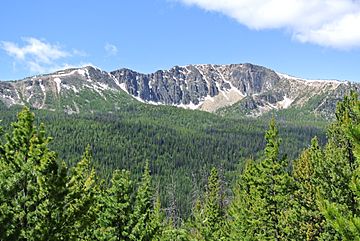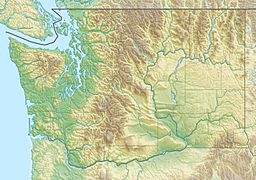Apex Mountain (Okanogan County, Washington) facts for kids
Quick facts for kids Apex Mountain |
|
|---|---|

Apex Mountain from the northeast
|
|
| Highest point | |
| Elevation | 8,297 ft (2,529 m) |
| Prominence | 977 ft (298 m) |
| Listing | List of highest mountain peaks in Washington |
| Geography | |
| Location |
|
| Parent range | Okanogan Range North Cascades Cascade Range |
| Topo map | USGS Remmel Mountain |
| Climbing | |
| Easiest route | Hiking |
Apex Mountain is a tall mountain in Washington state. It stands about 8,297 feet (2,529 meters) high. You can find it in Okanogan County.
This mountain is part of the Okanogan Range. This range is a smaller part of the larger North Cascades and Cascade Range. Apex Mountain is located about 2.5 miles (4.0 km) south of the border between Canada and the United States. It sits on the east side of the Cascade mountain range.
Apex Mountain is inside the Pasayten Wilderness. This area is managed by the Okanogan National Forest. The mountain closest to Apex Mountain that is taller is Amphitheater Mountain. It is about 2.35 miles (3.78 km) to the west-northwest.
The Pacific Northwest Trail is a long hiking path. It goes along the northern slopes of Apex Mountain. Water from Apex Mountain flows in two directions. It drains west into Cathedral Creek or east into Tungsten Creek. Both of these creeks flow into the Chewuch River.
Weather at Apex Mountain
The weather around Apex Mountain is mostly shaped by the Pacific Ocean. Most weather systems start over the Pacific. They then travel northeast towards the Cascade Mountains.
When these weather systems reach the North Cascades, the tall mountains force the air to rise. As the air goes higher, it cools down. This causes the moisture in the air to turn into rain or snow. This process is called orographic lift. Because of this, the west side of the North Cascades gets more rain and snow than the east side. This is especially true during the winter months.
In winter, the sky is often cloudy. But in summer, high pressure systems form over the Pacific Ocean. These systems usually bring clear skies. So, there is often little or no cloud cover during the summer months.
How Apex Mountain Formed
The North Cascades area has very rugged land. You can see sharp peaks, tall spires, long ridges, and deep valleys carved by glaciers. These different landforms and big changes in height happened because of geological events. These events took place millions of years ago. They also led to the different climates you see across the Cascade Range.
The Cascade Mountains started forming millions of years ago. This was during a time called the late Eocene Epoch. At that time, the North American Plate was slowly moving over the Pacific Plate. This movement caused many volcanic eruptions.
Also, small pieces of the Earth's outer layers, called terranes, came together. These pieces were from both the ocean floor and continents. They helped create the North Cascades about 50 million years ago.
Later, during the Pleistocene period, glaciers played a big role. This period started over two million years ago. Huge sheets of ice moved across the land many times. As they moved, they scraped away rocks and left behind rock debris. The river valleys in this area have a "U" shape. This shape was created by these recent glaciers.
The main forces that made the tall peaks and deep valleys of the North Cascades are:
- Uplift: This is when the Earth's crust pushes upwards.
- Faulting: This is when cracks form in the Earth's crust, and the land on either side moves.
- Glaciation: This is the action of glaciers shaping the land.
These processes working together created the amazing landscape we see today.
 | Georgia Louise Harris Brown |
 | Julian Abele |
 | Norma Merrick Sklarek |
 | William Sidney Pittman |



